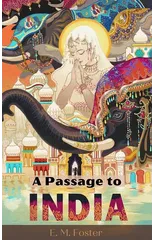On a journey to Tuscany with her young friend and traveling companion Caroline Abbott, widowed Lilia Herriton falls in love with both Italy and a handsome Italian much younger than herself, and decides to stay. Furious, her dead husband's family send Lilia's brother-in-law to Italy to prevent a misalliance, but he arrives too late. Lilia had already married the Italian and in due course becomes pregnant again. When she dies giving birth to a son, the Herritons learn that Lilia's one-time traveling companion, Caroline Abbott, wishes to travel to Italy once again, this time to save the infant boy from an uncivilized life. Not wanting to be outdone -- or considered any less moral or concerned than Caroline for the child's welfare-- Lilia's in-laws try to take the lead in traveling to Italy. In the public eye, they make it known that it is both their right and their duty to travel to Monteriano to obtain custody of the infant so that he can be raised as an Englishman. Secretly, though, they have no regard for the child; only public appearances.
E M Forster
E. M. Forster (1879-1970) was an English novelist known for his exploration of class differences and human relationships. His most notable works include "A Room with a View," "Howards End," and "A Passage to India." Forster's writing style is characterized by its clarity, wit, and insight into the complexities of human emotions. He is credited with portraying the inner lives of his characters with sensitivity and depth. Forster's contributions to literature include his exploration of themes such as imperialism, social injustice, and the struggle for personal freedom. His most famous work, "A Passage to India," is considered a masterpiece of modernist literature and continues to be studied and celebrated for its poignant portrayal of the clash between British colonizers and Indian natives. Forster's work has had a lasting impact on the literary genre of the novel, influencing generations of writers with his thoughtful exploration of the human experience.




